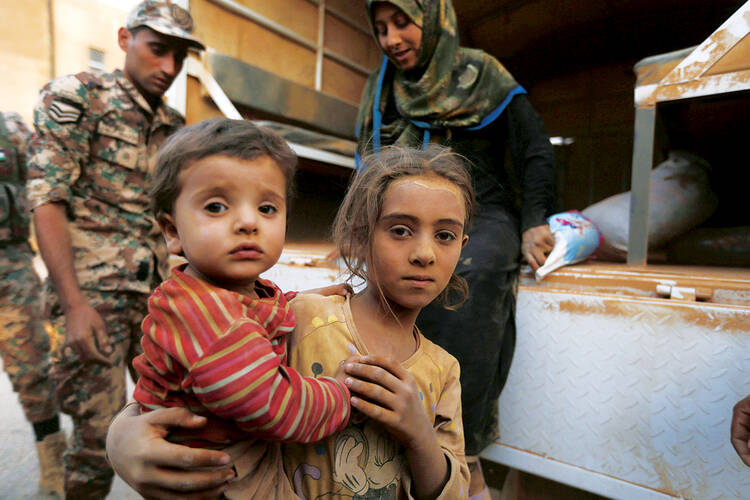The Obama administration announced on Sept. 10 that it would seek to admit 10,000 Syrian refugees during the next fiscal year in response to a growing crisis that has shocked consciences around the world. That number would reflect a significant increase from the 1,293 admitted in fiscal year 2015, but it falls far short of the number other nations have pledged to accept.
“The United States could take considerably more refugees for resettlement if it had the political will to do so,” said Mitzi Schroeder, the director for policy for Jesuit Refugee Service/USA. She explained that resettlement capacity is not an obstacle in the United States. In the past, in fact, much higher numbers of refugees have been absorbed. After the chaotic end of the Vietnam War, the United States resettled 10,000 refugees a month from Vietnam alone, according to Schroeder.
But now, she said, the “cumbersome and lengthy security procedures” put in place after 9/11 make rapid response to such crises problematic, requiring the deployment of tremendous resources to get refugees interviewed and approved.
Archbishop Joseph E. Kurtz of Louisville, Ky., president of the U.S. Conference of Catholic Bishops, issued a call for a stronger effort on behalf of Middle East refugees on Sept. 10, just a few days after a dramatic appeal from Pope Francis that every Catholic parish in Europe sponsor a refugee family. “I urge all Catholics in the United States and others of good will to express openness and welcome to these refugees, who are escaping desperate situations in order to survive,” he said. “Regardless of their religious affiliation or national origin, these refugees are all human persons—made in the image of God, bearing inherent dignity and deserving our respect and care and protection by law from persecution.”
Archbishop Kurtz encouraged a stronger response from the U.S. government to “assist more robustly the nations of Europe and the Middle East in protecting and supporting these refugees and in helping to end this horrific conflict.” He added, “The Catholic Church in the United States—with nearly 100 Catholic Charities agencies and hundreds of parishes assisting refugees to this country each year, and with Catholic Relief Services providing humanitarian aid to refugees in the Middle East and Europe—stands ready to help in this effort.”
Officials from Jesuit Refugee Service/USA welcomed the new commitment from the United States but suggested that the new numbers should reflect only the beginning of a more comprehensive effort to respond to the deepening crisis. J.R.S. officials point out that even as nations agree to higher refugee thresholds, the current bureaucratic process for registering, vetting and accepting refugees remains onerous and in its current composition will never meet the pressing needs of the crisis. Most resettlement officials agree that it would be best to increase the processing of resettlement applicants before they begin a hazardous flight across the Middle East and the Mediterranean to gain access to Europe.
But resettlement, “while tremendously important for some individuals,” is not the full answer for a crisis of this size, said Schroeder. “More resources are needed to improve the situation in the region to keep the door open for refugees arriving and to make refugees’ lives tolerable while in exile.” That could “alleviate the pressure forcing refugee families to take risky routes to seek better conditions.” She added, “Creative thinking is also needed on ways to make refugees safe and self-sufficient in the short term, for example, through a legal status including right to work, until some long term solution can be reached.”








